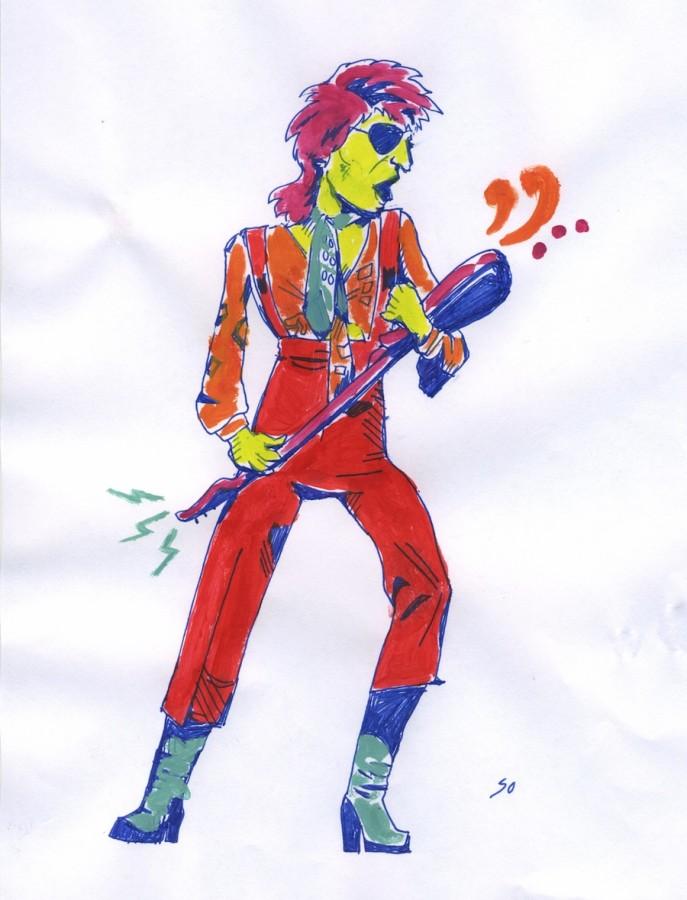How do we define criticism? Or that time I argued with a Pulitzer Prize-winning cartoonist
A depiction of the legendary David Bowie.
About a month ago, my family and the rest of the world were shocked to hear of David Bowie’s untimely death. He was not just an icon- he was the icon. When my mom was a teenager in the 1980s, she watched “The Breakfast Club” for the first of many times and was delighted to see that the film quoted Bowie’s song “Changes.” Of course she had heard the song many times before, but in that era, it summarized her coming of age. Similarly, a few years ago, I first watched “The Perks of Being a Wallflower,” a poignant film about high-schoolers set in the early 1990s. I was touched by the emotion displayed by the characters and was enraptured by the song “Heroes,” another Bowie classic that was featured heavily in the film. His music held a very prominent position in our lives. That is why we were stunned to see a cartoon by Steve Benson in “The Arizona Republic” a few days after his death.
We were having dinner at my grandparents’ house when we saw the cartoon, which depicts a theatrical Bowie and clearly states that he had no vocal or musical talent. All three generations (my grandparents, my mom and my brother and I) were dumbfounded. Surely this was a joke that flew over our heads, right? Bowie had just died, and most celebrities and journalists were pouring out messages of warmth, noting Bowie’s skills and influence. My eyes flickered to a message near the cartoon that gave Steve Benson’s email address, which I could use to lend feedback. Within two minutes, still at my grandparents’ house, I did just that.
My first email was almost too nice. I was overly polite and asked Benson if his cartoon was indeed some cryptic joke. I told him that if it’s not a joke, it comes off as disrespectful due to Bowie’s recent passing. I signed it as “Concerned Reader” and did not expect to receive a reply.
I was surprised to find that, less than five minutes later, Benson emailed me back. “I think the cartoon’s message was clear: I was not impressed by Bowie’s vocals or music,” he said. He went on to explain that in his “other life,” he is a DJ, which means that he is very aware of Bowie’s work. He told me that he found Bowie’s music to be “erratic” and explained that death is not a reprieve from criticism, the latter with which I totally agree. Benson then spoke about his right to free speech and, at the end of his email, quoted Benjamin Franklin: “If all printers were determined not to print anything till they were sure it would offend nobody, there would be very little printed.”
My thoughts on receiving this quick reply were varied. I had many arguments to the things he said, and I was a little offended that he seemed to assume my ignorance of free speech. Free speech was not the issue here. Benson obviously had a right to what he said, but that did not make it in good taste. So, naturally, I sent a response. I told him that it looked like he used Bowie’s death, a topical subject in the media, as an opportunity to spur a reaction from an audience. Then I explained to him that what he said about Bowie was not in fact criticism, but merely an expression of Benson’s personal opinion, closer to an insult. I said this: “It was hardly an analysis of the faults in Bowie’s musical style. Had your cartoon actually made a substantial point about the faults in his music, this email exchange (and the many others that I’m sure you’ve been engaged with today) could have been avoided.” Clearly the email I sent to him was not the first he had received that day. Otherwise, his reply would not have been sent so quickly.
Additionally, in his previous email, he seemed to assume that I was unfamiliar with Benjamin Franklin’s work in printing. That needed to be rectified immediately, seeing as I read Franklin’s autobiography in my Great Books AP U.S. History class. To do so, I quoted this little number by Franklin back to him: “Any fool can criticize, condemn, and complain—and most fools do.” Boy, that sure got his attention.
Benson fired back the next day with what I consider to be a lackluster, macho fluff response. He told me that he likes to provoke debate as a cartoonist. Seeing as he won a Pulitzer Prize for his work back in the day, I could see that going well for him. “Welcome to the bar room of American democracy, where the editorial cartoonist throws the first punch then stands back and watches Susan and the rest join in,” he said to me. I was disappointed that he completely ignored my argument about how it is wrong to use the recent death of celebrity, a low-hanging piece of fruit, as an opportunity to further reader response to his cartoon. I also found his reply to my argument about criticism weak. He told me that his second life as a DJ makes what he said criticism. I did not agree and felt no need to further the conversation.
This exchange with Benson was a thought-provoking one, for sure. It left me pondering the nature of criticism and how different people define it. I believe that criticism should be more than just a statement of opinion. If my English classes at Xavier have taught me anything, criticism should provide analysis and have a justified argument. Understandably, that is difficult to obtain via cartoons. However, it is not impossible. I have seen cartoons in my journalism class make concise criticisms extremely effectively. If anything, the challenge to convey worthwhile criticism in such a limited format hopefully will improve the quality of news cartoons and make for more interesting pieces in the future. Either way, this article deserves to end the right way, with a quote from Ben Franklin: “It is the first responsibility of every citizen to question authority.” If Benson and I can agree on anything, it certainly is that.




